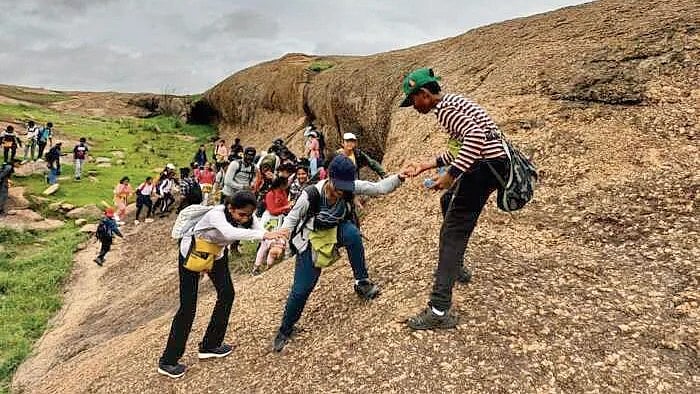
Credit: Special Arrangement
The love for the outdoors is growing among children in Bengaluru. Kids over eight are signing up for multi-day treks through the Western Ghats and even the Himalayas. Younger ones are going on day hikes 75-100 km from the city. Toddlers are exploring lakes, parks and urban forests on nature walks.
Organisers try to keep these trips as free of parents and phones as possible, encouraging children to step out of their comfort zones and connect with nature. They say Bengaluru naturally lends itself to outdoor activities, with everything from rocky hikes and forest trails to mountain peaks just a few hours or an overnight drive away across the state. While parents are the main drivers of this trend, schools, even montessoris, are now joining in.
Trekking has even crept into birthday celebrations. On Sunday morning, Disha marked her 10th birthday by cutting a cake atop a hillock near Nandi Hills after a 2.5 km hike with friends and family. The organisers had set up a scavenger hunt where children identified plants and rocks along the trail. “It was nice and fun. I like nature. We saw lizards and found peacock feathers,” says the Hennur resident. This wasn’t her first hike – she’s been at it for three years and has even done the popular sunrise climb up Skandagiri (1,450 m high). Her father, Shane Lobo, says the outdoors help kids unplug from screens, look out for each other as a team, and become more observant.
Being independent
Naresh Raju, who runs Outdoors Beckon, has been organising weeklong camps for children in the Western Ghats since 2012. And last year, his team took 10 children, including six from Bengaluru, to the Everest Base Camp. “Our first-ever camp had six kids. Now our groups average 25-35, mostly between the ages of 8 and 16. Sometimes seven-year-olds also join. The return rate is 65-70%. Some participants have started dreaming of becoming mountaineers or trek leaders,” he says.
Raju calls these camps “transformational” experiences. “On the first night, some children cry because they miss home and feel out of skin inside their tents. But by the fifth day, introverts become extroverts! There is a measurable change in their confidence and resilience. They are more open to new experiences. One parent recently messaged to tell me, their child now walks six kilometres to school,” he says.
Indiahikes School of Outdoor Learning has 47 schools on board, with 17 from Bengaluru. Among them, one school sends its students on compulsory hikes every Sunday, another organises weekday excursions for about 1,000 children annually, and a preschool blocks five dates each year. Programme advisor Mrudula Joshi says day hikes are often the first step for schools hesitant to try overnight camps. Children aged 6 to 10 are usually sent on day hikes, while students from Class 7 and above take on multi-day adventures, including three-night, four-day expeditions to peaks over 3,500 metres in Uttarakhand, such as Kedarkantha and Dayara Bugyal. “Our programme was meant for high-schoolers initially, but we opened it to younger kids after some educators noticed its impact. Because by the time they reach their teenage years, children become less open to new experiences,” she says.
She says parents are often “shocked” by how independent their children become after these outings. On day hikes, they help clean the trail. And at campsites, they pitch tents, read maps, and do stargazing. Or, cook and pack their own bags, tasks they rarely do at home. “They learn to cope with uncertainties like weather changes or leeches showing up!” she says.
Since 2022, Nomad’s Camps has been hosting school groups at its campsite on Devarayanadurga Hills, Tumakuru. Each group is capped at 40 students and typically comprises students from classes 6 to 10. It is a small number, but a new category for the organisation. They started receiving such enquiries only after the pandemic. “Here, the children get to go on short nature walks. The forest is home to species like the yellow-throated bulbul, and the calls of peacocks echo throughout the day. Stargazing is a favourite activity, thanks to Devarayanadurga’s clear, dark skies,” says CEO Sandeep T K.
Children are open-minded
‘Mountain’ Manjunath from Mysuru-based Karnataka Hikes says the presence of gated communities in Bengaluru plays a key role in spreading the word. “One kid goes on a trek, likes it, tells a bunch of his friends in the apartment, and we start getting enquiries,” he explains. He started the Children’s Trek and Travel Club initiative in May and has taken a dozen batches hiking in the past two months. The initiative targets children aged 5 to 16 and offers two kids-only hikes and two family treks each month, in addition to multi-day camps in the Western Ghats. His team educates participants about the trees, wildlife, and rivers of the ecosystems they visit, as well as local weather, culture, food, education systems, and even agriculture. “One group this May was lucky enough to witness the rescue of a king cobra in Agumbe,” he says.
Growing up, Manjunath was drawn to the outdoors. He believes all children have an inherent connection with nature because “their minds are open, their senses are alert, and their relationship with the world is still forming”. Summing up, he says: “Most children today are squeezed between schoolwork and expectations at home. What gets left out is their natural connection with the earth and a sense of unstructured discovery. When such experiences disappear, we lose an entire generation’s intuitive relationship with nature.”